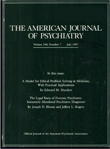Getting the cost right in cost-effectiveness analyses
Abstract
OBJECTIVE: The authors examined different ways of measuring unit costs and how methodological assumptions can affect the magnitude of cost estimates and the ratio of treatment costs in comparative studies of mental health interventions. Four methodological choices may bias cost estimates: study perspective, definition of the opportunity cost of resources, cost allocation rules, and measurement of service units. METHOD: Unit costs for outpatient services, individual therapy, and group therapy were calculated under different assumptions for a single community mental health center (CMHC). Using hypothetical service utilization profiles, the authors used the unit costs to calculate the costs of mental health treatments provided by two programs of the CMHC. RESULTS: The unit costs for an hour of outpatient services ranged from $108 to $538. The unit costs for an hour of therapy varied by 156%; unit costs were lowest if the management perspective was assumed and highest if the economist perspective was assumed. The ratio of the outpatient costs in the two treatment programs ranged from 0.6 to 1.8. CONCLUSIONS: The potential errors introduced by methodological choices can bias cost-effectiveness findings based on randomized control trials. These errors go undetected because crucial methodological information is not reported.



